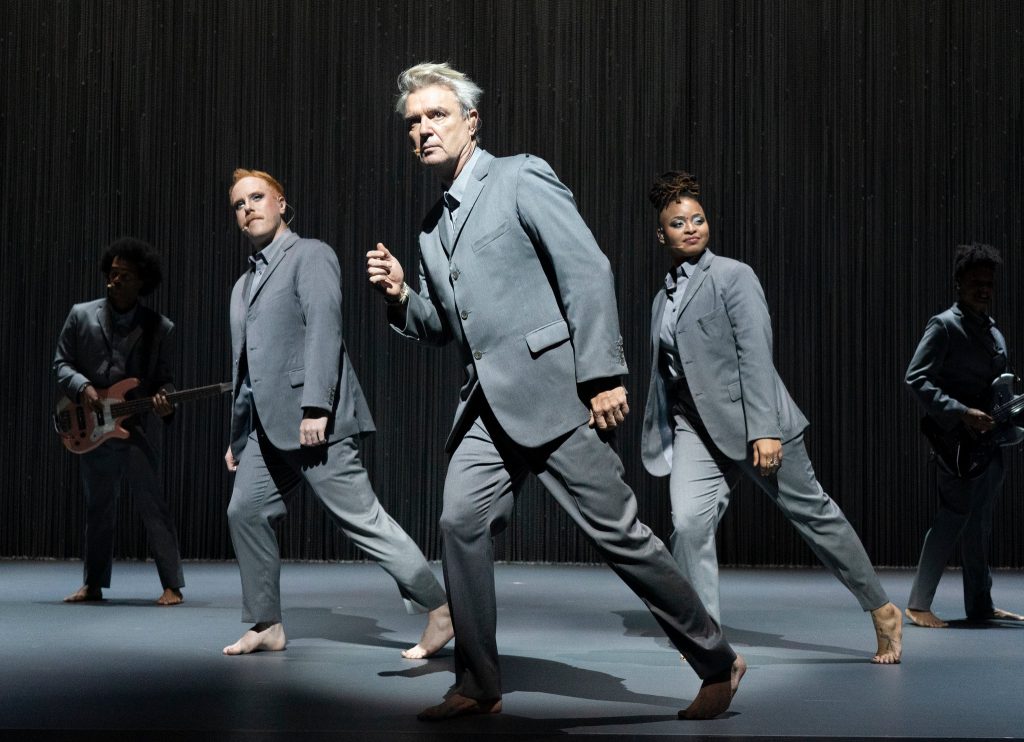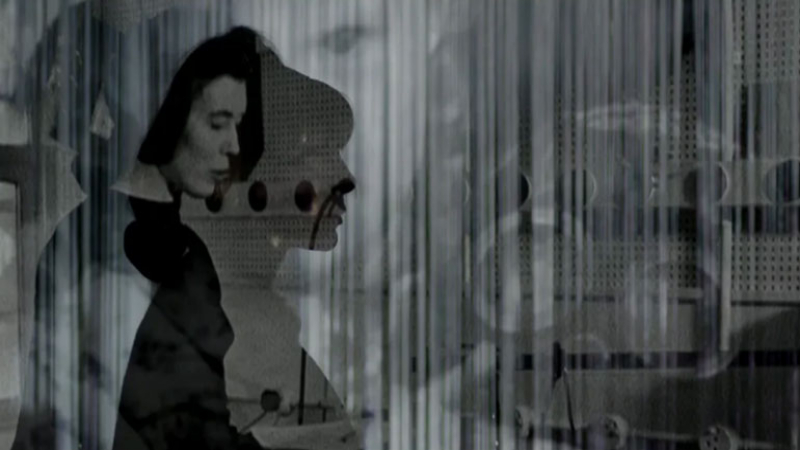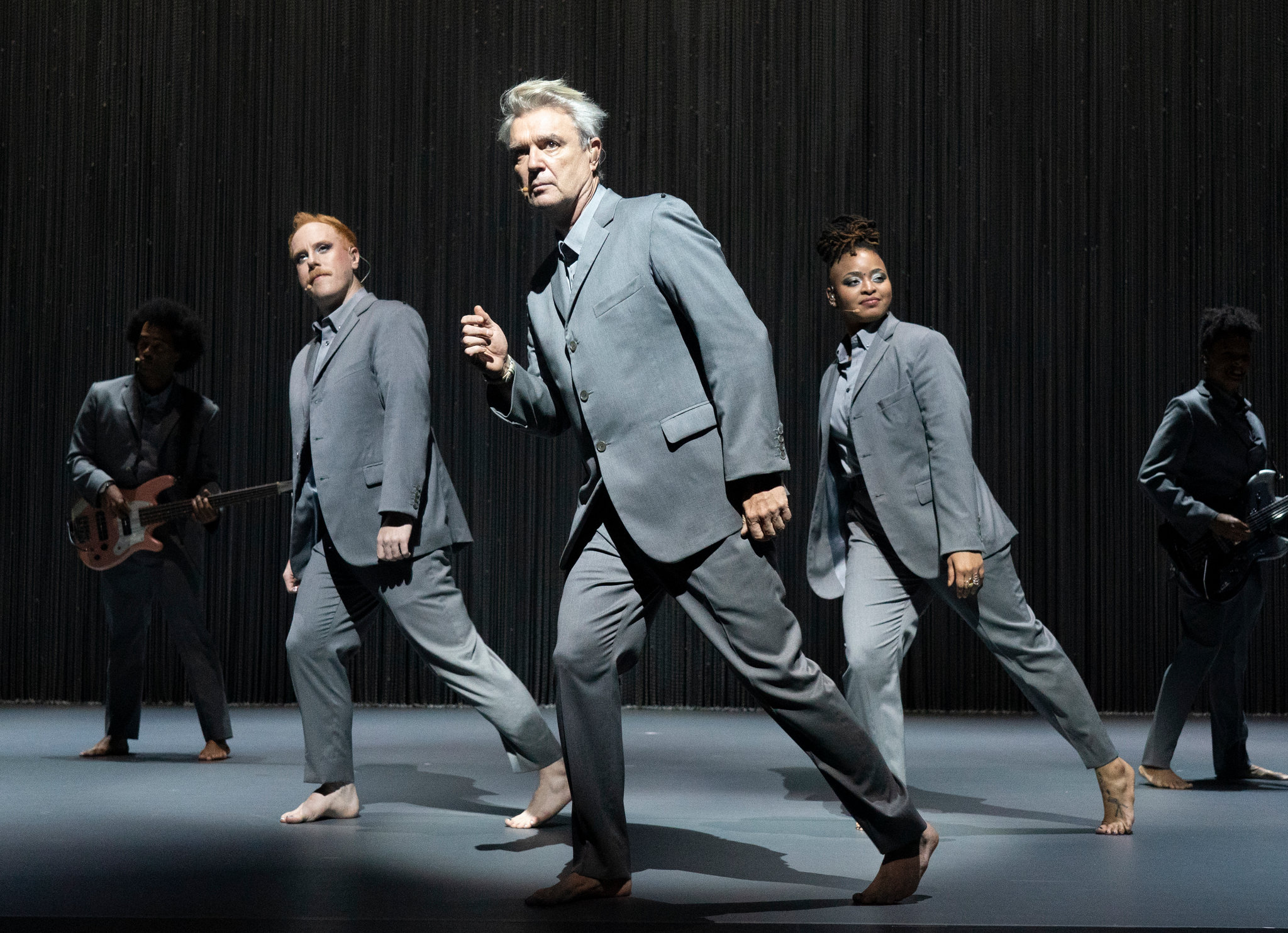On the seventh day LFF offers up two very different music documentaries that perfectly capture their subjects’ personas. Spike Lee directs David Byrne in the film version of his Broadway show American Utopia, while director Caroline Catz casts herself as the titular musical visionary in docu-drama Delia Derbyshire: The Myths and Legendary Tapes.
American Utopia

If it weren’t enough for David Byrne to already been involved in one of the greatest concert films of all time with Stop Making Sense (when he fronted seminal new wave band Talking Heads), he returns thirty-six years later with American Utopia. A lot has happened in the interim, with the band breaking up and Byrne continuing his success with a solo career. Fitting then that the new film acts as a career retrospective, taking songs from across his career and recontextualising them into a commentary on modern society.
Byrne performs a full range of songs from his extensive back catalogue. There is a heavy showing from his solo career (and collaborations with Brian Eno) but there are lot of Talking Heads songs in the mix. The big hits get an airing – with “Burning Down the House” literally bringing down the house – but there are also some very welcome surprises, with a cover of Brighton Port Authority’s “Toe Jam” being a totally unexpected addition. Byrne binds these songs together by theme, looking at aspects of society and culture such as racism, immigration, political activism and mass media. Connecting these themes are brief moments where Byrne addresses the audience directly, providing a clear narrative through-line for the performance.
Featuring a full band that has been “untethered” from the traditional configuration of drums to the back and guitars to the side, every musician takes part in the performance. This allows for a uniquely malleable stage choreography that can resemble a New Orleans second line one moment, and then in the next morph into a twirling human cross that takes up the entire stage. This approach brings out an energetic liveliness to the performers and the audience which is absolutely infectious, leaning into the overall goal of the show: that when we all come together on common ground we can achieve some kind of utopia.
These elements come together brilliantly, and combined with other lighting and stage effects the whole performance pops off the stage. Spike Lee’s direction is perfectly pitched, too. Lee is of course filming a live performance, so the cameras are unobtrusive but also placed in the right places for optimum effect in the edit. A camera hanging from the ceiling captures the intricate choreography which can then cut to cameras to the side to provide a close up of the performer’s faces and the instruments being played, every movement and droplet of sweat captured in all its glory.
The film continues in this vein for the majority of its running time, and for fans of Byrne and Talking Heads it is a wonderous experience. But then Byrne and Lee provide the audience with an utter gut punch that proves the utopia Byrne hopes to achieve is still a long way off. The band proceed to do a cover of Janelle Monae’s “Hell You Talmbout” which is a protest song that was forged from the Black Lives Matter movement. The song consists of Byrne and the band singing out the names of Black people who were killed by the police and calling on the audience to say their names. While this is powerful in its own right, Lee then cuts away from the concert to introduce a montage that puts an all-too-human face on the plight of African Americans throughout history. This moment takes American Utopia from a terrific concert film into an essential call-to-action.
Director: Spike Lee
Featuring: David Byrne, Jacqueline Acevedo, Gustavo Di Dalva
Writer: David Byrne
Delia Derbyshire: The Myths and Legendary Tapes

The name Delia Derbyshire may not ring many bells in the minds of most people, but to musicians, sound designers and sci-fi fans alike her name has reached legendary status. Famous for her contributions to the BBC Radiophonic Workshop in the 1960s, and even more famously her rendition of Ron Granier’s theme for Doctor Who, Derbyshire lived most of her life in relative obscurity. It is only now that her innovative approaches to music and sound are being recognised for how ground-breaking they really were.
The film begins like a regular documentary, with a montage of talking heads reminiscing about working with Delia and their impressions of her as a person and her creative process. A title card outlines how a cache of Delia’s recordings were uncovered in 2001, which brought to light her extensive back catalogue. Then Cosey Fanni Tutti (formerly of Throbbing Gristle) appears to discuss how these legendary tapes connect her to Delia in a spiritual sense, across time. The film then melts into a hazy, dreamlike recreation of Delia’s life, featuring director Caroline Catz playing Delia herself as she struggles to pursue her art in a world that doesn’t understand her immense talent or appreciate her ambition.
As a woman who studied music and mathematics at Oxford, Delia cut an enigmatic stride in 1960s London. Men in power did not know what to do with her and, when allowed to flourish, her creative mind baffled the grey-suited establishment with her superiors, who unable to categorise her call her the “Enchantress of Numbers”. Eventually landing a job at the BBC Radiophonic Workshop, she was relegated to the position of a “sound assistant” because no one considered experimental audio manipulation as music. For the most part Delia is happy to be left toiling in the workshop and while the story surrounding her vital influence on the Doctor Who theme gets an airing, the film moves quickly on from there to focus on her less celebrated work and her innovations in electronic music.
Catz fashions a fascinating portrait of one of British music’s true trailblazers. The decision to intercut re-enactment with traditional documentary techniques makes the film as enigmatic as the woman at its centre. Cosey Fanni Tutti also provides the music, using Delia’s original recordings, and they perfectly weave together an at once delicate but alien soundscape to chart Delia’s journey. Catz successfully gives dimension to Delia as a flesh and blood heroine in a world run by men, but she also has room to engage with the myth of Delia, positioning her somewhere between feminist philosopher Mary Wollstonecraft and mathematician Ada Lovelace (there is a sequence where she has a drunken conversation with both of them). This casts Delia amongst the great feminist icons of history, at once ephemeral and understandable, and finally gives her the credit for her contribution to modern musical landscape that is well overdue.
Director: Caroline Catz
Writer: Caroline Catz



